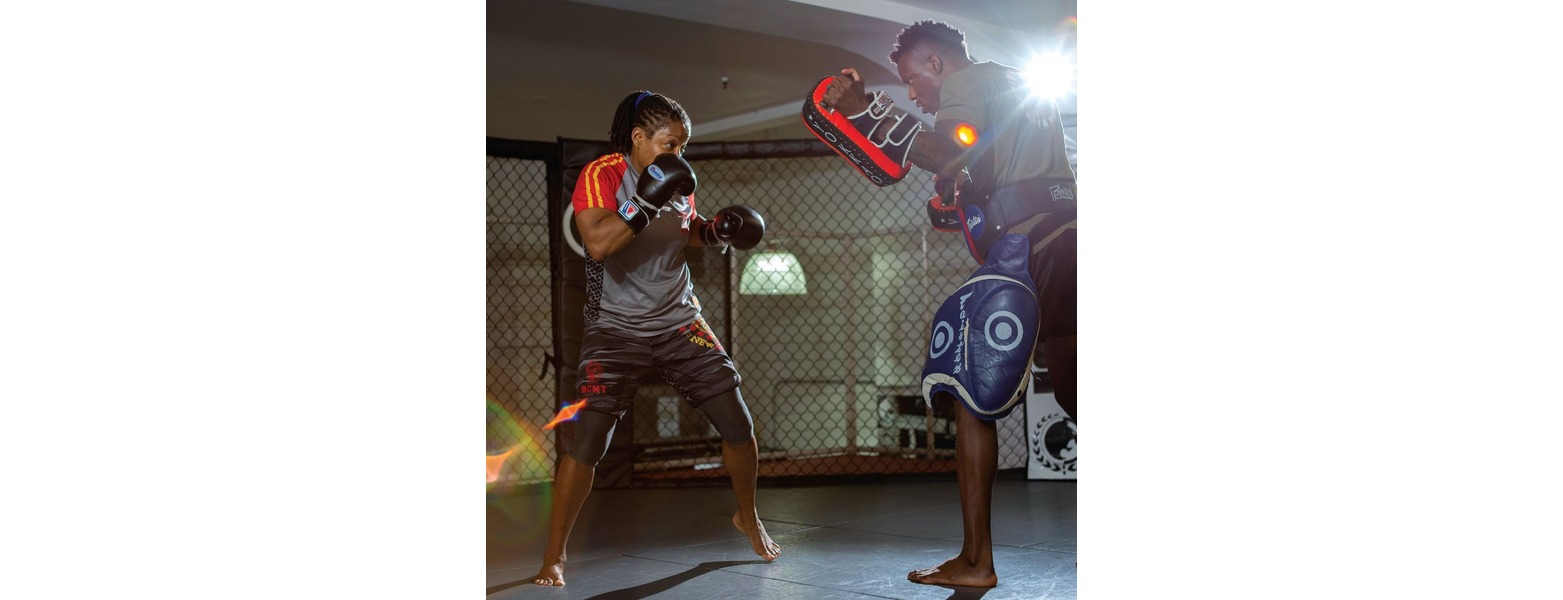FORMER RUGBY HALL OF FAMER PHAIDRA KNIGHT LAUNCHES NEW ACTIVEWEAR COLLECTION
Size-inclusive, cause-oriented clothing line caters to women of diverse backgrounds.
Phaidra Knight made headlines when she became the first African American inducted into the World Rugby Hall of Fame. The lifelong athlete had played in the Rugby World Cup three times, and received the prestigious honor of being named USA Rugby Player of the Decade in 2010.
Now, as a two-time all-world player, Knight is gaining notoriety for her new venture: PSK Collective, a sustainably sourced street and activewear fusion line that is size-inclusive and cause-oriented. The collection, available on Walmart.com, is made up of 42 trendy pieces that range from sizes XS to 3XL for female shoppers of all different body types. In order to further the conversation around gender equity in athletics, 15% of all profits from the line are donated to the Women’s Sports Foundation.
Knight decided to create this line because she’s often struggled to find clothing that fit her. “I have always had an athletic and muscular build and as a result, I was often forced to turn to custom and semi-custom clothing options,” she says. “Identifying this whitespace in the fashion market, I was inspired to create a fully inclusive line that caters to athletic-bodied girls, women, and individuals, while bringing much needed attention to women athletes.”
PSK Collective includes women’s mesh tops, jackets, biker shorts, track pants, and dresses that feature anti-odor, sweat proof, and chafe-free materials. The models are diverse—young, old, African American, white—which is intentional, since Knight is a huge proponent of diversity.

“Diversity, inclusivity and equality are the driving factors behind PSK Collective’s brand and business,” she says. “We stress diversity not only in the composition of our staff but also in our Athlete Ambassadors. Our Ambassadors are of different ages, races, orientations, come from different sports, and rock different styles, therefore they appeal to a very broad range of people.”
In her time as a rugby player, Knight did not experience overt discrimination because she was an African American, but shares she dealt with microaggressions. However, as a woman, she was openly discriminated against. “I experienced discrimination along with my other female teammates. As a USA National Team player, the women were not afforded the same resources, funding and media that our male counterparts [were], although we were a successful program.”
By giving 15% of all proceeds to the Women’s Sports Foundation, Knight is doing her part to empower women in athletics. The organization, founded in 1974, provides funding to aspiring female champion athletes and groundbreaking research that shows the gaps in access for girls and women in sports.
“WSF has been the leading voice driving gender equity in sport and has positively shaped the lives of millions of youth, high school, and college student athletes as well as elite athletes and coaches,” she says. “It’s dedicated to strengthening and expanding participation and leadership opportunities through its research, advocacy, grants and fellowships, educational curricula, mentoring events, and wide range of community programs. Our work is not done until equity and equality are achieved.”
Knight’s rugby career began at the end of her first year in law school at the University of Wisconsin. She loved playing rugby because of its aggressive, competitive and contact nature. “There was nothing better than the challenge of evading a defender by way of going around or going through them, tackling a ball carrier behind the gain line, and rucking an opponent attempting to poach the ball from a teammate,” she says.
As an 18-year member of the U.S. women’s national rugby team, Knight got to travel and experience new places while doing what she loved. “Rugby literally took me around the world,” she says. “But the thing that I loved the most and still enjoy is the camaraderie that comes with the game. I have formed some incredible and lifelong relationships as a result of this sport.”
Even though she isn’t playing rugby anymore, she’s still highly involved in athletics. In 2017, she was named head coach of Monroe College’s new women’s rugby team, she coached the Under 19 New York Rugby Club, and she was a coach and director of Play Rugby USA, the Olympic nonprofit that works with underserved communities in New York. She founded Peak Unleashed in 2019, a nonprofit that provides physical and personal development to marginalized youth through yoga and rugby. Now, she’s also training to become a professional MMA fighter.
On her time in the rugby community, Knight shares that the sport has a long way to go, but it’s moving in the right direction in terms of inclusivity. She still believes that sports in general can be more inclusive, and that it all starts with leadership.
“Sports organizations can hire diverse members of their staff and build their boards to reflect that same diversity,” she says. “They can create educational sessions where members, employees, and athletes learn about other cultures and create a sense of belonging for everyone. Coaches can create a code of conduct that requires that equal respect be given to all. They can listen and display empathy to everyone, setting the example for others to follow. Coaches can create an environment that never tolerates derogatory or belittling language between athletes.”
There are several reasons why Knight thinks that it’s important for sports to be inclusive—a team’s success thrives on a large pool of talent, and playing sports make people happier and healthier, because it helps them contend with stress. This leads to a better society overall.
“When children see folks they identify with playing sports, it expands their horizons and as a result, they believe they can be anything they want to be,” she says. “Success in sports gives people with social disadvantages the confidence to succeed in other areas of life.”









